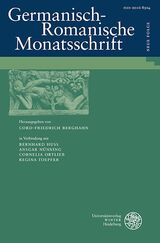Bernhard Huss, Irene Fantappiè, Nicolas von Passavant, Christian Wiebe, Franziska-Katharina Schlicker, Cord-Friedrich Berghahn, Susanne Fontaine, Dietrich Scholler, Karen Struve, Marco Gutjahr, Christina Schaefer
Germanisch-Romanische Monatsschrift,
Jahrgang 68 (2019),
Ausgabe 4,
Seite 473 - 512
Hans Rudolf Velten, Bernhard Huss, Roman Lach, Franziska-Katharina Schlieker, Cord-Friedrich Berghahn, Sebastian Neumeister, Fabian Hauner, Marta Serena, Albert Göschl
Germanisch-Romanische Monatsschrift,
Jahrgang 68 (2019),
Ausgabe 3,
Seite 359 - 394
Claudia Jacobi, Bernhard Huss, Cord-Friedrich Berghahn, Oliver Gent, Georges Güntert, Paolo Brusa, René Sternke
Germanisch-Romanische Monatsschrift,
Jahrgang 68 (2018),
Ausgabe 2,
Seite 243 - 270
Bernhard Huss, Eugenio Refini, Cord-Friedrich Berghahn, Anna Cordes, René Sternke, Christoph Söding, Maddalena Graziano, Milan Herold, Luca Viglialoro, Thea Santangelo, Fermin Suter, Annette Keilhauer, Erik Schilling
Germanisch-Romanische Monatsschrift,
Jahrgang 67 (2018),
Ausgabe 4,
Seite 459 - 497
